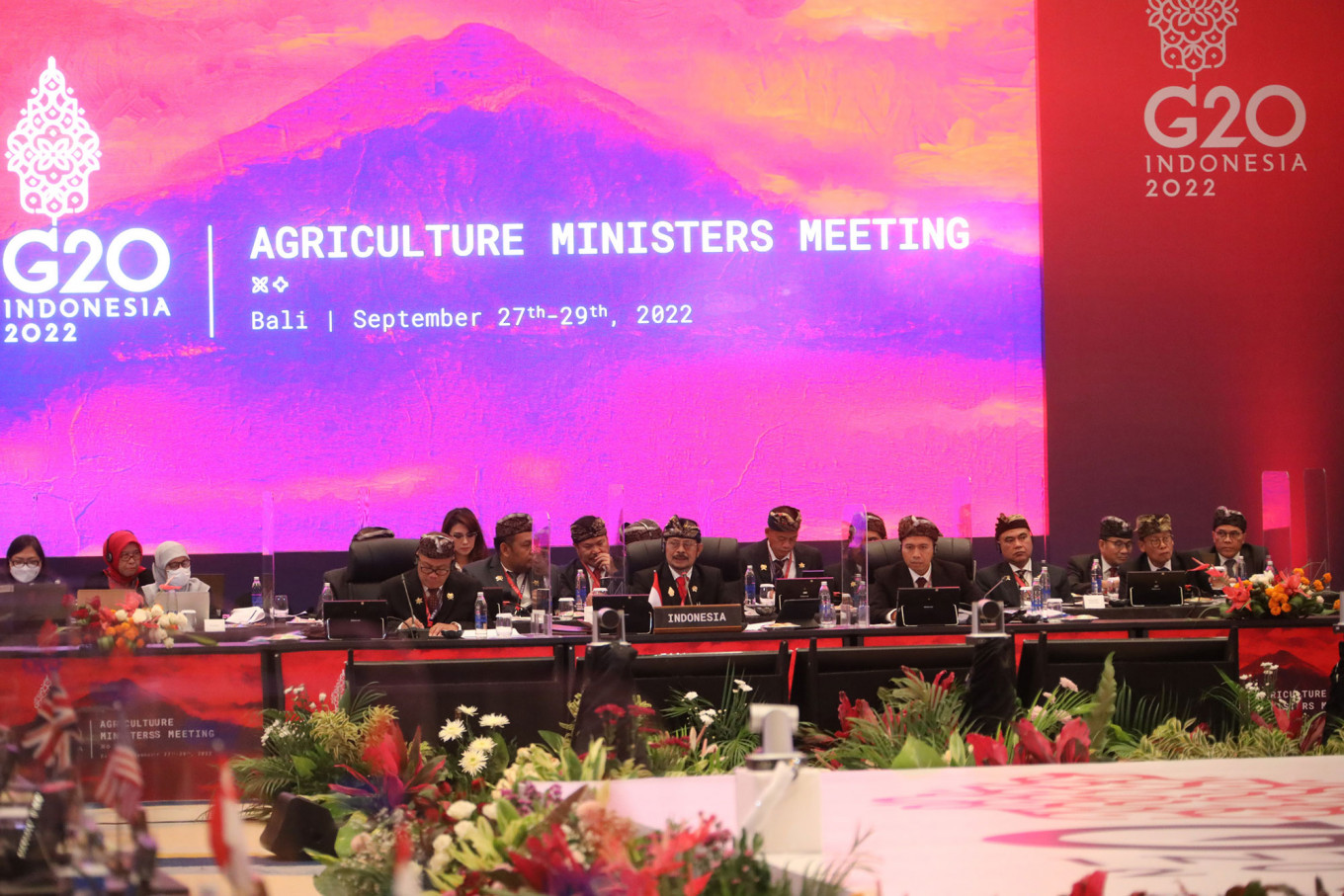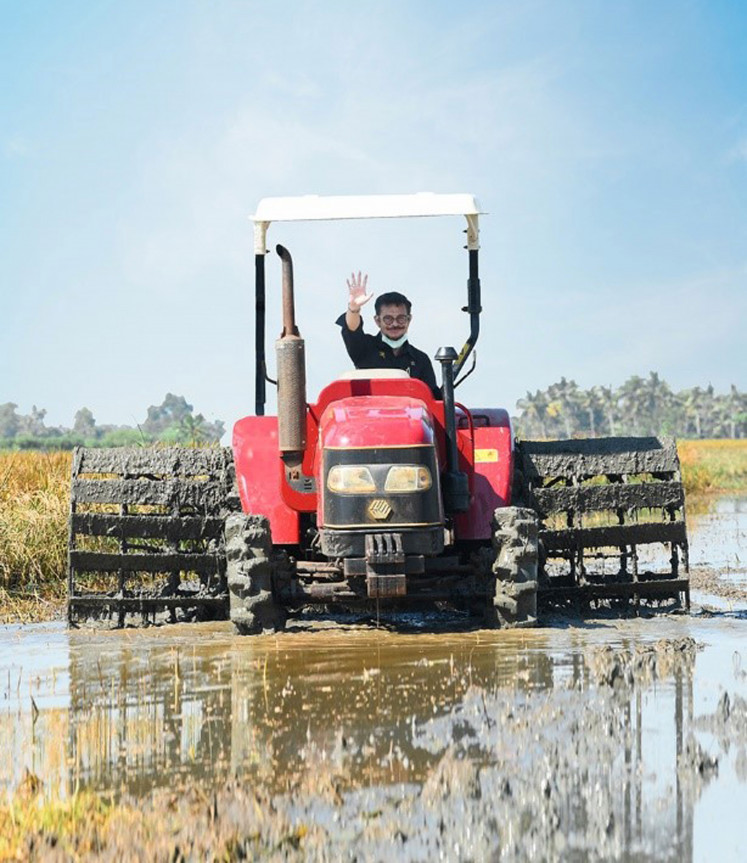Popular Reads
Top Results
Can't find what you're looking for?
View all search resultsPopular Reads
Top Results
Can't find what you're looking for?
View all search resultsFulfilling food for all is a basic human rights issue
Change text size
Gift Premium Articles
to Anyone

The Group of 20 (G20) Agriculture Ministers Meeting (AMM) was officially closed with a strong commitment to move forward with concrete actions that address the threats of a global food crisis and ensure food security and sustainability for all, with full support for the G20 Presidency of Indonesia.
“Food is an issue related to human rights,” said Agriculture Minister Syahrul Yasin Limpo during the closing press conference in Jimbaran, Bali, on Sept. 28.
This year’s G20 AMM, held between Sept. 27 and Sept. 29, carried the theme “Balancing Food Production and Trade to Fulfil Food for All,” aiming at embodying the G20 commitment in fulfilling food for all by ensuring the balance of supply chain between resilient and sustainable food systems and agriculture and smooth cross-border trade for agriculture and food products.
The presence of 188 delegates from G20 members and non G20 member countries as well as International organizations, including the Food and Agriculture Organization (FAO), the World Bank, the Organization for Economic Cooperation and Development (OECD) and others, have shown vigorous combined efforts to face the current global challenges, from the climate change crisis and the Covid-19 pandemic to the escalation of geopolitical tensions in various parts of the world.
The newly launched 2022 edition of the State of Food Security and Nutrition in the World (SOFI) Report, confirms that world hunger has significantly increased in 2021. The report states that 828 million people suffered from hunger in 2021, an increase of 46 million from 2020 and 150 million from 2019 before the pandemic.
The recent war in Ukraine has added to an already challenging situation and could lead to an increase of 13 million more chronically undernourished people this year and 17 million more in 2023, the FAO estimates. Another global challenge is the rising inflation, with world food prices increasing since mid-2020, reaching an all-time high in March due to many factors.
The FAO also calculates that the increase of the food import bill for the 62 most vulnerable countries reaches US$24.6 billion in 2022, badly affecting 1.79 billion people globally.
“We must take immediate action in the short, medium and long term, to accelerate the transformation of agriculture and food systems in becoming more efficient, inclusive, resilient and sustainable and to ensure better food, nutrition and environmental production, without missing or leaving anything behind,” said Syahrul.
To respond to these growing challenges, as the G20 Presidency, Indonesia has proposed three priority issues: firstly to promote a resilient and sustainable agriculture and food system; secondly, to promote an open, fair, predictable, transparent and non-discriminatory agricultural trade, and thirdly, to ensure availability and affordability of food for everyone.
“The majority of the delegates have accepted the proposed issues, which were translated into 22 paragraphs of the Joint Communiqué. It is encouraging that 21 out of 22 paragraphs are fully accepted and agreed upon by all delegates. This is a significant and massive outcome of the AMM,” Syahrul said.
The three priority issues, continued Syahrul, would be easily implemented provided that all G20 countries were committed to work and to jointly move forward.
“Collaboration is the key to overcoming current and future challenges. We believe that only through tight collaboration and synergy we can bring Recover Together, Recover Stronger into realization,” he added.
Syahrul highlighted the resilience and achievements of the agricultural sector during the challenging time growing at 18.8 percent. “We have good rice stock, adequate for the next two years with 1.2 million metric tonnes to be exported to countries in need,” he said.
Indonesia implements a number of initiatives such as the One Country One Priority Product (OCOP), the 1000 Digital Village Initiatives, the Loans to Small-scale Farmers (Kredit Usaha Rakyat/KUR) program and many others supported by various national and international organizations and financial institutions.
“But, we are not speaking for ourselves anymore. We are speaking on behalf of the G20 members. Let us focus on things that bring us together. We must quickly unite, despite our differences,” Syahrul added.
“We need each other. The AMM Forum is an opportunity for us to remove any barriers to safeguard the global supply chain,” he said.
Meanwhile, at the sideline of the G20 High Level Ministerial Dialog Session/Global Forum on digital agricultural transformation in accelerating women and youth entrepreneurship on Sept. 27, Qu Dongyu, director general of the FAO stressed the importance of speeding up the digital transformation in the agricultural sector.
“A digital transformation opens important opportunities across agri-food systems to take concrete steps in ending poverty,” he explained.
“Digital solutions can help “Recover together, quickly, stronger, smarter and greener for sustainable economic growth and development,” he added.
The side event aimed to foster the digital agenda as a key pathway in which younger people are often well-versed and primed to contribute, particularly as entrepreneurs across the spectrum, from production to sales to the transformation of agri-food systems.
“Digitalization has great potential to drive progress toward an inclusive future for the world’s small holder farmers and can help galvanize greater productivity and sustainability of agri-food systems as well as improve livelihoods and options for women and the youth,” Dongyu said.
“Developing digitally skilled rural communities is a cornerstone for progress toward Sustainable Development Goals (SDGs) as it allows for diversification of incomes and can unlock on and off farm employment and business opportunities for new generations,” added the director general.
“Young people are best placed to acquire the knowledge needed to uptake new technologies, make the agricultural value chain more tech-savvy and spearhead digital transformation in rural areas.”
“Technological and social innovation can reduce market failures and improve market functioning,” Dongyu said.
Meanwhile, Syahrul insisted that innovation, technology and digitalization have been playing pivotal roles in advancing global agriculture. “You join the agricultural digitalization or else you die of food shortages,” he said.
Indonesia is now moving forward to achieve an advanced, independent and modern agriculture. “Today is a great opportunity for us to share perspectives on our efforts in improving women and youth capacities in digital agriculture implementation,” Syahrul elaborated.
Young entrepreneurs as producers, distributors, marketers and sellers can become innovative entrepreneurs by using technology to create more innovative business models.
“In the era of the industrial revolution 4.0, the agriculture sector is shifting from relying on manual labour to digitalization and mechanization, including smart farming,” he explained.
The women and youth entrepreneurship in agricultural development has become a central focus in many countries, including the G20 members. These countries, including Indonesia, have put a lot of effort into understanding the character traits of young entrepreneurs, providing a conducive and supportive environment and identifying the most appropriate method to develop their talents.
Data from the 2019 Statistics Bureau Agency (BPS) shows there were 33.4 million farmers in Indonesia, 8 percent or 2.7 million were young people aged between 20 and 39 years old and 8 million farmers were female, mostly living in rural areas.
Indonesia has been implementing the Youth Entrepreneur and Employment Support Services (YESS) program, a collaboration between the Agriculture Ministry and the International Fund for Agricultural Development (IFAD) aimed at producing modern, independent and skilled young entrepreneurs in the agriculture sector as well as a competent agricultural workforce.
“Almost everyone in Indonesia owns at least one mobile/smartphone,” Syahrul said.
According to digital data from 2021, the number of smartphone users in Indonesia was estimated to have reached 199.2 million, the fourth largest smartphone market worldwide after China, India and the United States.
“Mobile phones today allow small farmers to have real time data on soil, climate, irrigation, pests and diseases as well as market price. They also enable access to loans, customers and input suppliers for commercial transactions, even at a smaller scale,” Sayhrul added.
To conclude the three-day AMM forum, all delegate members visited the Jatiluwih Rice Terrace in Tabanan Regency on Thursday morning (Sept. 29). Designated as a UNESCO World Heritage Site, JatiLuwih is living proof of centuries-old Balinese Subak traditional farming and irrigation system that has successfully sustained the island’s organic farming system.
“We are eager to showcase the Balinese’s farming tradition to all G20 members and delegates; the richness and wisdom of the locals in maintaining its agricultural treasures,” Syahrul said.
During the bilateral meeting between Indonesia and the FAO, its Director-General Qu Dong Yu commended Indonesia for the success in building a resilient agri-food system, feeding almost 275 million people, and noted the importance of transforming agri-food systems and focusing on green development.
The director-general also commended the strong leadership of the President and the Agriculture Minister on the development in Indonesia and reiterated his firm commitment for the continued support by the FAO to Indonesia.
“The G20 Presidency provided an opportunity to show Indonesia’s experience and leadership and of its potential as a leading example in the region for agriculture development,” Dongyu concluded.











